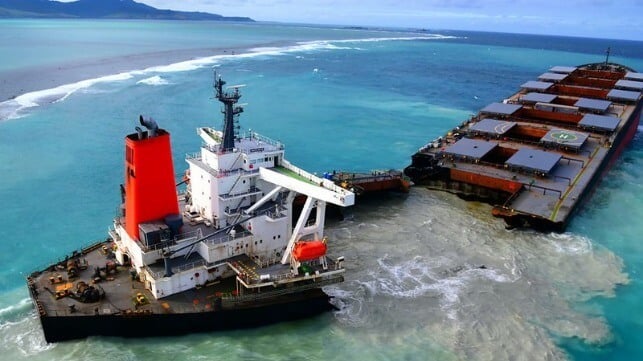Mauritius Cites Lack of Safety Culture and Local Failure in Wakashio Report

The Court of Investigation convened by Mauritius released a new report into the 2020 casualty of the bulker Wakashio, which broke apart after grounding and caused significant environmental damage. While much of the report covers details previously released in a preliminary report as well as investigations by Panama as the flag state and the ship’s operator, it also provides new insights into institutional failures and a “culpable omission” by the local authorities.
The 223-page report was completed in August 2025, but was just released on October 2. In the Preamble, the court said the purpose was not to duplicate previous efforts but to look at the underlying causative factors of the accident. Its mandate was to also look for safety deficiencies affecting the overall management and to make recommendations, including future preparedness and response protocols.
While nothing new, it details the efforts to find an internet signal and the birthday party the day of the grounding, where the captain consumed alcohol along with the crew. The report, however, cites the culture aboard the vessel and a “series of breaches of maritime discipline.” It says the officers were “absorbed” in the search for an internet signal and their cell phones.
The report acknowledges that the crew, due to the COVID-19 pandemic, was overdue for leave and waiting for a “convenient port” for a crew change. Going through the Malacca Strait, the captain also permitted a course deviation to find an internet signal so the crew could communicate with family and friends at home. As they approached Mauritius, the report says the chief officer was focused on his phone and neglected his duties on the bridge to oversee the navigation. They conclude there was a ”total failure to comply with basic navigation rules.”
They cite “insufficient route planning,” noting the captain deviated course days earlier to avoid a storm but did not tell the chief officer. They failed to properly plan the passage near Mauritius, lacked a large-scale nautical chart of the area, and were overly dependent on an “over-zoomed small-scale Electronic Navigation Chart on the Electronic Chart Display Information System.” When the ship came dangerously close to shore, company rules called for the master to take command, and despite being on the bridge, he did not, possibly because he had consumed four alcoholic drinks by that point and was waiting for the chief officer to provide a cell phone link.
The master permitted the cadet lookout to remain at the party. There was no qualified lookout on the bridge. They also cite failures in the management systems and coordination with the vessel’s owners.
The report, however, also turns to what it concludes was a failed and confused response by the local authorities. They find that despite the ship being on a clearly dangerous course, the Mauritian surveillance system failed, and no alert was sounded even fifteen minutes before impact. The authorities failed to react in time, and there was a slow, poorly coordinated response afterward.
The report finds Mauritian institutions worked in silos, and sometimes in complete confusion. There is a contention that the ship could have been pulled off the reef in the first days if the response had been properly organized. Instead, they find that 96 square km of coral reefs and marine habitats were destroyed. They estimate the cost at $2.5 billion.

that matters most
Get the latest maritime news delivered to your inbox daily.
The court believes the accident was entirely preventable had there not been failures both on the ship and onshore. They are making recommendations for far-reaching reforms. This includes the contingency plan, as well as training and equipment, and critically improved coordination between institutions.
The conclusion is that Mauritius cannot afford a second Wakashio. There are still calls in the country for a police investigation into the National Coast Guard. The Mauritian newspaper L’Express concludes that the report opens a new era of accountability and decision-making.
